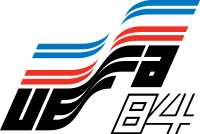1984 UEFA European Football Championship
 The
1984 UEFA European Football Championship final tournament was held in
France. West Germany also bid for the hosting of this event. It was the
seventh European Football Championship, held every four years and
endorsed by UEFA. The final tournament took place from 12 to 27 June
1984. At the time, only eight countries took part in the final stage of
the tournament, seven of which had to come through the qualifying
stage. France qualified automatically as hosts of the event; led by
Michel Platini, who scored nine goals in France's five matches, Les
Bleus won the tournament – their first major international title.
The
1984 UEFA European Football Championship final tournament was held in
France. West Germany also bid for the hosting of this event. It was the
seventh European Football Championship, held every four years and
endorsed by UEFA. The final tournament took place from 12 to 27 June
1984. At the time, only eight countries took part in the final stage of
the tournament, seven of which had to come through the qualifying
stage. France qualified automatically as hosts of the event; led by
Michel Platini, who scored nine goals in France's five matches, Les
Bleus won the tournament – their first major international title.
Mascot
The official mascot of this European Championship was Peno, a rooster,
representing the emblem of the host nation, France. It has the number 84
on the left side of its chest and its outfit is the same as the French
national team, blue shirt, white shorts and red socks.
Overall impressions
Very few hooligan-related incidents were recorded throughout the
tournament. Only one minor instance of fan trouble was recorded, in
Strasbourg around the West Germany vs. Portugal match. The small group
of German hooligans responsible for the incidents was arrested and
deported back to West Germany on the same day using a new law specially
passed by the French Parliament ahead of the Euro. Overall, the
organisation was flawless, a feat that established France's credentials
as a host nation and eventually helped it win the right to stage the
1998 FIFA World Cup.
The entire competition was marked by exceptionally fine weather which,
along with the high quality of play throughout the tournament (a welcome
change from the 1980 European Championship) and the absence of
hooligans, contributed to a very positive and enjoyable experience for
teams and fans alike.
Tournament format
After trying out several formats, UEFA finally developed for the 1984
tournament the format that would serve for all subsequent eight-team
European Championships. The eight qualified teams were split into two
groups of four that played a round-robin schedule. The top two teams of
each group advanced to semi-finals (reintroduced after being absent from
the 1980 tournament) and the winners advanced to the final. The
third-place game, widely perceived as an unnecessary chore, was dropped.
As usual at the time, a win was credited with two points only, teams on
equal points were ranked by goal difference instead of head-to-head
results, and the sudden-death rule in extra time did not apply.
Semi-finals and the Final
The first semi-final between France and Portugal is often considered one
of the best matches in the history of the European Championship.
Jean-François Domergue opened the scoring for France but Portugal
equalised through Rui Jordão on 74 minutes. The game went to extra time
and Jordão scored again in the 98th minute to give the Portuguese a
shock lead. But the French rallied and Domergue scored sixteen minutes
after Portugal went ahead. Then, with the penalty shoot-out looming,
Platini scored his 8th goal of the championship to give France a
memorable 3–2 victory.
The other semi-final between Spain and Denmark saw two evenly-matched
sides cancel each other out and the game ended 1–1; Soren Lerby’s goal
after only 7 minutes was equaled by Maceda’s goal an hour later. There
was no scoring in extra-time and the match went to a shoot-out where
Spain converted all five of their penalties to win 5–4. Spain were
through to final of the European Championship for the first time since
1964.
The final was played to a capacity audience at the Parc-des-Princes in
Paris and the home fans would not be disappointed by their team. Just
before the hour mark, Platini scored from a free-kick to put France in
control. Spain fought hard to get back in to the match but were unable
to find a way through. France were reduced to ten players when Yvon Le
Roux was sent-off but the Spanish were unable to make their advantage
count. The hosts held on to the lead and Bruno Bellone’s goal in 90th
minute made the final score 2–0. France had won their first major
championship in world football.
Venues
1. Parc des Princes in Paris with 48,000 seats
2. Stade Velodrome in Marseille with 55,000 seats
3. Stade de Gerland in Lyon with 40,000 seats
4. Stade Geoffroy-Guichard in Saint-Etienne with 53,000 seats
5. Stade Felix-Bollaert in Lens with 49,000 seats
6. Stade de la Beaujoire in Nantes with 53,000 seats
7. Stade de la Meinau in Strasbourg with 40,000 seats
photos
| Ranking | Player | Country | GS (PEN) |
- Year
- Winners
- Runner-up

